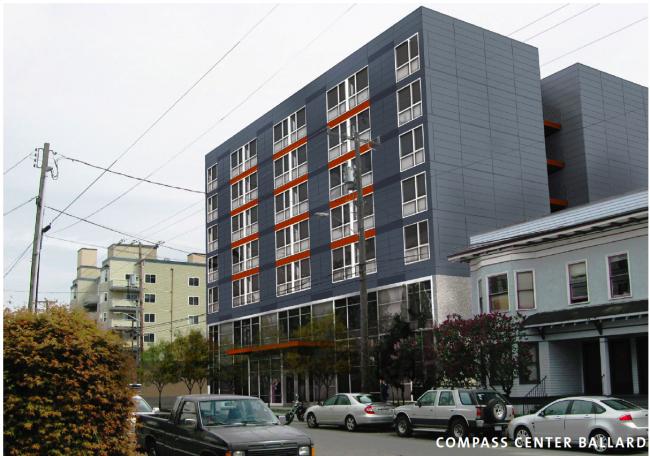Urness House construction planned for winter
Construction on Compass Housing Alliance's Urness House, seen here in rendering, is planned to get underway this winter.
Fri, 07/23/2010
Though the city has not granted the project its Master Use Permit yet, the Compass Housing Alliance plans to begin construction on Urness House, its Ballard housing development for formerly homeless individuals, this winter.
M.J. Kiser, Compass program director, announced the loose construction timeline for the seven-story, 80-unit development at 1753 N.W. 56th St. at the July 14 Ballard District Council meeting.
After back-to-back State Environmental Protection Act and Design Review meetings June 14, the project appeared ready to be given the go-ahead by the city, both in terms of design and environmental impacts.
Urness House will house chronically homeless men and women earning less than $8,000 per year. There will be onsite services, such as mental health clinics, substance abuse clinics and triage services. Click here for more information on Urness House policies.
With construction on the project looming, a handful of Ballardites accepted Compass Housing Alliance's offer to take tours of some of their other facilities.
Dennis Galvin, a member of the Ballard District Council and Crown Hill Neighborhood Association, toured the Pioneer Square Men's Program and the Cascade Women's Program.
Galvin said he took the tours as a resident and not as a representative of any neighborhood group. He said the negative statements made at the June 14 meetings surprised him and he wanted to learn more about the facility coming into the heart of Ballard.
"There's kind of a lot of bad vibes out there," he said. "I wanted to know if it was something real or the fear, uncertainty, doubt thing."
Galvin said he personally always wants to do what he can to help homeless people, but he was becoming conflicted the more negative opinions he heard on the project.
"The tour allayed any doubts I had about the facility," he said. "I feel that Compass will be a good neighbor."
Galvin said he was most surprised by the cleanliness at the Pioneer Square Men's Program, which houses and provides meals for 78 men.
"I expected things to be not maintained, not will lit," he said.
He said the facility was kept clean inside and out, and there was no loitering outside despite the services provided onsite.
Jean Darsie of the Ballard Homes for All Coalition toured the Shoreline Veterans Program and the Cascade Women's Shelter.
She said she has been excited for the Urness House development because it will give Ballard's homeless residents an opportunity to apply for housing, and the tours only confirmed her feelings.
Darsie said she was never concerned about Urness House but was curious about how it might be run and felt it would be good to see other Compass facilities to be able to speak from experience.
What surprised her most about the facilities was their sheer ordinariness, she said.
"They looked so ordinary from the outside," she said. "I saw nothing at any of these locations that would say to me, 'This is a place where formerly homeless people live.'"
Darsie said she was also impressed by the sense of peace and orderliness on the inside of the facilities.
"The difference between these facilities and apartment buildings and condo complexes was the degree of caring and support that existed once we got inside," she said. "What better healing environment for people who have experienced the chaos and danger of living on the streets."
Not everyone on the tours was as initially supportive as Galvin and Darsie.
Galvin said there were two people on his tour that were not necessarily in favor of Urness House. By the end of the tours, one of them seemed to have been converted while the other was not, he said.
The Compass Housing Alliance facilities toured by Ballard residents have some key differences with Urness House.
The Pioneer Square Men's Program, while a similar size, requires its residents to be clean and sober, as does the Cascade Women's Program. That will not be a requirement at Urness House.
Both the Cascade Women's Program and the Shoreline Veterans Program are smaller in size than Urness House, with housing for 32 and 25 respectively.
Finally, all three facilities are more transitional in nature than Urness House will be, with the Veterans Program having the lengthiest maximum stay at two years. Urness House residents can stay as long as they want.
With Urness House on the way to becoming reality, Galvin said his biggest lingering concern is how its residents will be received by Ballard.
"The negativity in the neighborhood is rather bothersome to me," he said. "Compass [Housing Alliance] has to reach out and the neighborhood has to reach back for this to be a successful thing."


